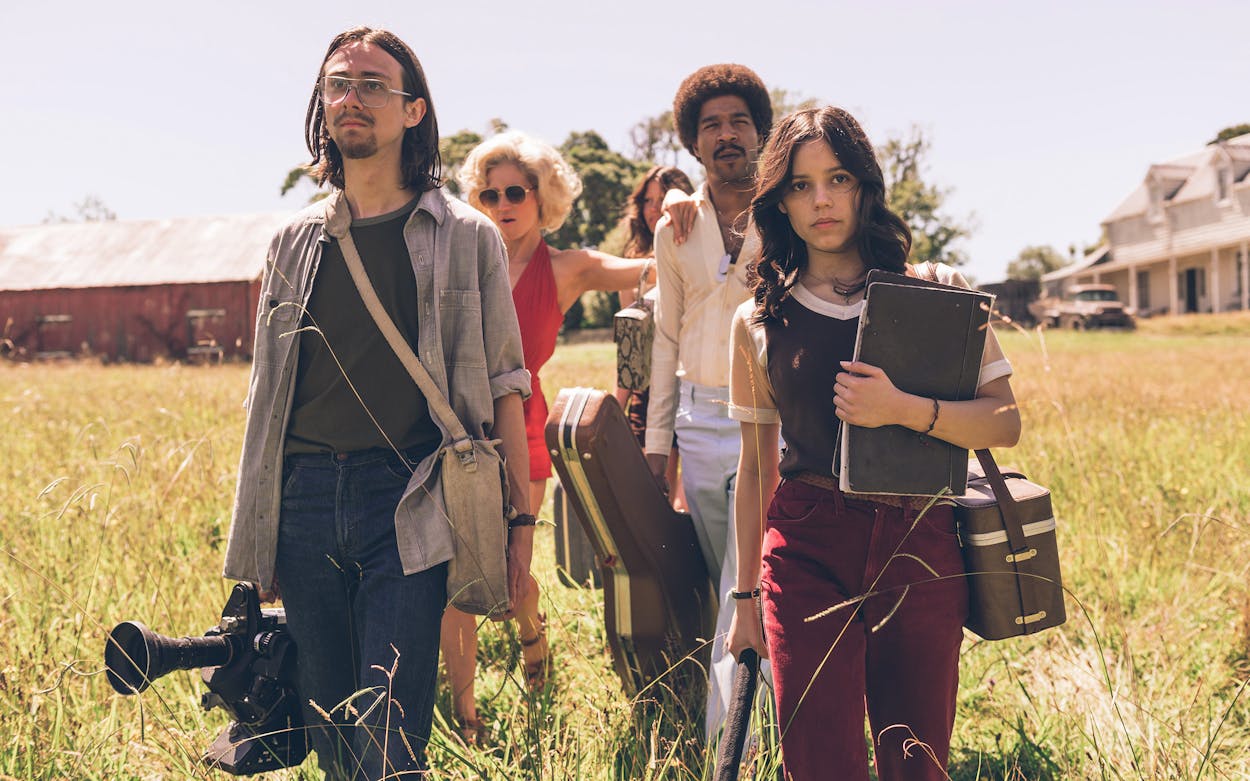On the surface, the premise of A24’s latest horror flick, X, sounds a lot like The Texas Chain Saw Massacre: it’s the seventies and a group of friends drive into middle-of-nowhere Texas, where most of them meet sensationally gory fates. But by the end of the wild hour-and-forty-five-minute ride, the film might actually be a bit more like M. Night Shyamalan’s 2021 thriller, Old. Just scarier, funnier, and a hell of a lot hornier.
Set in 1979, X follows members of an adult-film crew as they head from Houston to a secluded boarding house out in the country to shoot their first project. There’s the smooth-talking producer, Wayne (Martin Henderson), who’s sure the film will make him rich; 23-year-old director RJ (Owen Campbell), who’s set on making “art” rather than porn; and RJ’s quiet girlfriend, Lorraine (Jenna Ortega), who rounds out the crew as boom operator.
The stars of their amateur film, “The Farmer’s Daughters,” are Bobby-Lynne (Brittany Snow), Jackson Hole (Scott Mescudi, a.k.a. Kid Cudi), and Wayne’s girlfriend, Maxine (Mia Goth). When they arrive at their destination, it’s clear that their hosts—the elderly Howard (Stephen Ure) and his wife Pearl (also Goth, unrecognizable under prosthetics)—weren’t exactly told what the crew would be getting up to.
The film is writer-director Ti West’s big return to feature-length horror after a nearly decade-long hiatus during which he did occasional television directing stints, most recently a couple episodes of Amazon’s horror series Them. He made his big break in 2009 with The House of the Devil and scored another hit with 2011’s The Innkeepers. X was intended as a love letter to the slasher genre, and to one Texas film in particular. West said after its Sunday premiere at SXSW, “There’s a certain amount of Texas Chainsaw that’ll loom over any horror movie, especially one set in the seventies in Texas.”
The film is chock-full of tributes to the seminal classic, among other slashers, but these moments serve a dual purpose: they pay homage and subvert expectations. They set the audience up for one movie and deliver something else entirely.
X works in comedy—much of it, unsurprisingly, during the filming of “The Farmers’ Daughters”—and in commentary, and West takes particular care to carve up perhaps the oldest trope in horror: punishing female sexuality. In the 1996 meta-slasher Scream, cinephile Randy Meeks (Jamie Kennedy) says the first rule to surviving a horror movie is “you can never have sex.” (On that count, half of X’s characters are set up to fail.) Indeed, “death by sex”—sexually active female characters are the first to die—and the “final girl”—the lone survivor is the “virtuous” female—are long-standing horror devices. But X flips the script.
The female stars of X aren’t ashamed of sex. Maxine is a star, or at least she’s convinced she will be. She repeats her mantra multiple times: “I will not accept a life I do not deserve.” Both she and Bobby-Lynne are confident in what they do, and after a brief dustup with Lorraine over their line of work, they push back on her prudish assumptions, eventually empowering her to participate in the film.
These moments sell us on the group’s budding friendships, but just when we begin to get attached, West employs a split screen to remind us that this is a completely different kind of story.
So while the audience laughs as Bobby-Lynne and Jackson Hole deliver their hilariously corny lines, we also lean forward in our seats, watching as Maxine, who wandered off to explore the property, is invited inside the main house by Pearl. Up to this point, we’ve seen Pearl only from a distance, staring down at the friends from her window. Up close, she’s striking. Her thin, wispy white hair and long white nightgown stand out in contrast to Maxine’s colorful eyeshadow and youthful overalls. “I used to be beautiful,” Pearl tells Maxine, guiding her to an old picture from her years as a dancer. In another, she’s with Howard on their wedding day. “He would’ve done anything for me. That’s the power of beauty.”
Pearl stands in contrast to a long line of male villains who were nowhere near as developed. This is, in part, because West also takes time to show us Pearl in softer, melancholic moments when she’s staring at her reflection, putting on makeup in the mirror. She isn’t a slasher villain who’s trying to punish young adults for having sex, she’s wreaking havoc on them because they represent everything she’s lost.
Once night falls, West kicks things into overdrive as the elderly Pearl and Howard, fueled by their pain and spite, dish out their vengeance at an impressively vigorous pace. The first kill is a standout: bathed in the glow of van headlights, a bloody Pearl performs a chilling dance set to a song that’ll be instantly familiar to horror fans. In another delightful deviation from the traditional horror tropes, West also makes a point to kill off the men first.
Even in its most insane moments, X wants us to interrogate our own beliefs on sex. Why are we repulsed by the idea of Pearl’s sexuality? Why do we find her brazen desire so disconcerting and Maxine’s so empowering? Though Pearl and Howard might be monsters, their motives are grounded in a basic, terrifying truth: we all get older. It’s just as easy to imagine the bitterness that consumes them both eventually consuming Maxine or Bobby-Lynne. West drives this home by having Goth play both Maxine and Pearl.
With X, West manages to have it all. At once terrifying, depraved, and full of sophisticated subtext, the film packs in both style and substance, giving horror fans a healthy dose of nostalgia and innovation.








